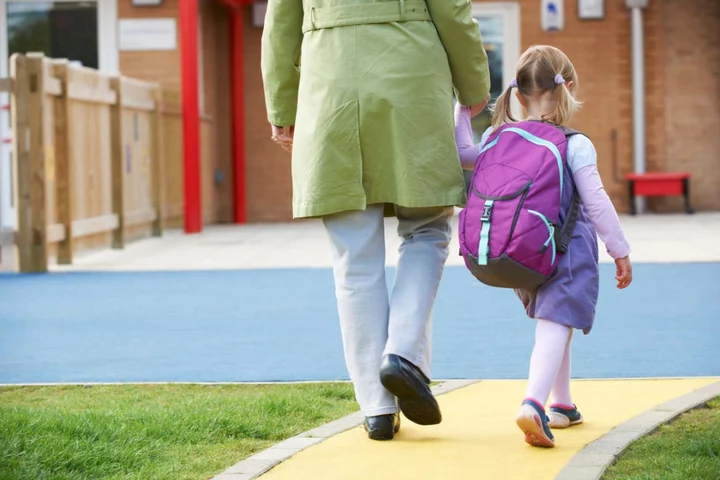
Rimini Street Announces Expansion and General Availability of Rimini Manage™ Services for SAP Cloud Products
LAS VEGAS--(BUSINESS WIRE)--Jul 26, 2023--
2023-07-26 21:25

Desktop Health and Carbon Partner to Bring Flexcera™ Family Resins to the Carbon Digital Manufacturing Platform
BURLINGTON, Mass. & REDWOOD CITY, Calif.--(BUSINESS WIRE)--Jul 26, 2023--
2023-07-26 20:57

Circle Pharma strengthens its executive leadership team with two senior appointments in Clinical Development
SAN FRANCISCO--(BUSINESS WIRE)--Jul 26, 2023--
2023-07-26 20:26

Age of Learning Appoints Dr. Daniel A. Domenech as Superintendent-in-Residence
LOS ANGELES--(BUSINESS WIRE)--Jul 26, 2023--
2023-07-26 20:21

Moderna/Merck begins late-stage study of skin cancer vaccine combination
Moderna said on Wednesday it has begun enrolling patients in a late-stage study evaluating its personalised mRNA-based skin
2023-07-26 20:18

The seawater temperatures in Florida are at hot tub levels
The warming waters threaten marine life and ocean ecosystems including by bleaching coral reefs.
2023-07-26 19:55

Grandmother with rare cancer that led to amputation shares first warning sign
A grandmother who was diagnosed with a rare cancerous tumour after her ankle “looked a bit swollen” had to have her leg amputated, but she is now walking with a prosthetic and has achieved her goal of waltzing again with her husband. Shirley Parnell, 75, a retired production coordinator, who lives in Kings Langley, Hertfordshire, with her husband, Lawrence, 76, a retired chartered surveyor, noticed a lump on her ankle in July 2022, and little did she know, it would lead to a devastating diagnosis. Shirley “assumed it would be something that (doctors) could fix”, but, after several scans, she was diagnosed with spindle cell sarcoma, a rare malignant cancerous tumour, and was told a leg amputation would be the only way forward. The mum of two and grandmother of two felt “shocked and in disbelief” as it “hadn’t even crossed (her) mind” that she was going to be diagnosed with cancer. After the surgery, Shirley had an “overwhelming sense of relief” and focused on getting better – to motivate herself, she set herself the goal of being able to dance with her husband again. But, while learning to walk again, Shirley was diagnosed with metastasis lung cancer and could not help but feel “a little bit cheated” as her parents lived until their 90s and she now knows “that’s probably not going to happen.” She did not let this get in the way of her achieving her goal, and in the middle June 2023, she danced with her husband again at a friend’s wedding and said she “had a real sense of achievement”. In July 2022, Shirley got her first warning sign of cancer when she experienced pain in her right ankle. Shirley told PA Real Life: “My ankle started to look a bit swollen – at first, I didn’t think anything of it as I assumed I had just knocked it on something in the house and not realised, but then I noticed a lump. “The lump kept moving around and the pain started to get more intense. So much so that I decided to go and see my local GP.” Shirley’s GP thought it could be a blood clot, so she was prescribed cream and tablets, but after a week, nothing improved. She was then referred to Watford General Hospital for a blood test and an X-ray. Shirley said: “I had just assumed it would be something that they could fix with some medication and the thought of something more serious didn’t really cross my mind. “It was only when they said that the X-ray had come back showing some abnormalities and they wanted me to have an MRI scan, a CT scan and a biopsy that I started to worry. “A few weeks went by, and I tried not to think about the results but then I got a call saying the results were back and they wanted to see me, and I just felt like it was going to be bad news.” At the appointment, Shirley was told she had spindle cell sarcoma, a rare malignant cancerous tumour which can develop in the bone or soft tissue. The doctor suggested that the only option for Shirley was to have her leg amputated to remove the tumour. She said: “As he said those words, I felt shocked and disbelief. “I thought at the time, only last week I was living my life normally, doing things I would come to take for granted such as walking to the shops or going to a Pilates class. “It hadn’t even crossed my mind that it might be cancer, let alone that I would lose a limb because of it.” So, on October 24 2022, at the Royal National Orthopaedic Hospital in Stanmore, Greater London, Shirley had the surgery. She said: “I was very nervous going into surgery but funnily enough I was okay once it was done. “I just had an overwhelming sense of relief that that part was finished. “Everyone has always said to me that I am a very determined person and after the surgery, I just started to look to the future as I felt everything was getting better, so I focused on working towards that.” But, once her leg was amputated, Shirley could not help but feel like she had lost some independence. She said: “Before I could just pop out to pick up some essentials but I had to rely on others to help me, something I am learning to get better at. “I’m so grateful for my husband running me around though.” On January 27 2023, Shirley had a cast made for her prosthetic leg, and it was fitted a week later. She said: “Then came the long and challenging journey of learning how to walk again. “The staff at the Prosthetic Rehabilitation Unit at the Royal National Orthopaedic Hospital were amazing and their support was what got me through those first few weeks and helped me get used to my new way of moving. “I felt strange but excited with my new leg – it felt like it was a real step forward into being more independent.” When in physiotherapy, Shirley made it her goal to be able to dance at her friend’s wedding with her husband. She said: “My husband and I always loved dancing – he joked that we’ll be doing a jive, but I said maybe a slow waltz.” But, at the end of April 2023, she was diagnosed with lung cancer. She said: “My parents lived until they were well into their 90s and I’ll be honest, I fully accepted with my family history that I would do the same. “So it came as a bit of a shock that I now know that that’s probably not going to happen. “I felt a little bit cheated, I suppose, but the other thing it has made me realise is that there are people a lot worse off than me.” Determined not to let the diagnosis impact her goal, Shirley practised walking even more, and at the middle June 2023, they danced together at the wedding. She said: “It was wonderful, I had a real sense of achievement, and being able to have a few dances during the evening was wonderful. “My husband was really proud of me too. “My family have been unbelievably supportive, I can’t thank them enough. “They were so happy for me that day.” Now, Shirley remains under the hospital’s care, having regular scans, and has since passed her driving assistance test. She is also raising money for the Royal National Orthopaedic Hospital Charity for its Impossible Possible campaign. Looking back on the last few years, she said: “I appreciate things a lot more now – I take time to appreciate my garden, the flowers blossoming, and my family. “I feel so lucky that I could have the amputation, and it puts things into perspective definitely.” Read More Mother reveals bruise on her toddler’s eye led to cancer diagnosis Jonnie Irwin details experience with palliative hospice care Ben Cohen’s ex-wife says she had only ‘one symptom’ before cancer diagnosis What is cardiac arrest? The condition that LeBron James’ son suffered from Mom left ‘appalled’ after water park says she can’t breastfeed son in lazy river Government has more work to do to ensure families secure quality childcare – MPs
2023-07-26 19:50

'There's a lot of passion': Greta Gerwig responds to right-wing Barbie anger
Greta Gerwig has issued a diplomatic response to the conservative commentators who have been left angered by 'Barbie'.
2023-07-26 19:24

Wildfires Are Set to Double Canada’s Climate Emissions This Year
When the greenhouse gases released from Canada’s 2023 wildfires are eventually tallied, they will be at least double
2023-07-26 19:17

Study reveals the best exercises to lower blood pressure
A study has found the best exercises to lower blood pressure, so get ready to go to the gym. Research published in the British Journal of Sports Medicine and conducted at Canterbury Christ Church and Leicester universities, compared the efficacy of different forms of exercise on reducing blood pressure and found that “isometric exercises” – which involve engaging muscles without moveme are your best bet. That means it is time to hold a wall-sit, or plank for ages. Fun times. The study examined 270 randomised controlled clinical trials, involving 15,827 participants, on the effects of different types of exercise on resting blood pressure. It even found that these isometric techniques were almost twice as effective as government recommended exercises, aerobic activity like cycling and walking, though they found these other forms of exercise were effective too. Reducing blood pressure reduces your chance of stroke, heart failure, and other issues. Sign up to our free Indy100 weekly newsletter Over-40s are advised to have it checked every five years. Treatment often involves medication but patients are also advised to eat healthily, reduce alcohol intake, stop smoking and exercise regularly. Jamie O’Driscoll, a reader in cardiovascular physiology at Canterbury Christ Church university and senior author of the report, said in isometric exercises the muscle remained contracted but did not change in length. This static contraction could squeeze the vessels that supplied blood to the working muscles – which reduced the flow of blood to the muscle during the exercise and therefore oxygen supply to the muscle. When the muscle relaxed afterwards, it caused a large flow of blood through the vessels (this was different to other modes of exercise) and was likely to be the trigger driving these greater improvements in blood flow regulation. “Performing 4 x 2 minutes of wall sits, with 2-minutes’ rest in between, three times per week, is an effective way to reduce your blood pressure,” said O’Driscoll. “They should be done alongside other exercise modes, to provide the maximum range of exercise choices rather than limiting them.” Dr Kush Joshi, a sports and exercise medicine consultant and fellow of the Faculty of Sport and Exercise Medicine, welcomed the study’s findings, but questioned how easy it would be for patients to do. “The reality is a significant proportion of the population will not be able to do a plank or wall sits, and furthermore may not enjoy these types of activities,” he said. “Solutions need to be found to make these exercises accessible to all individuals with elevated blood pressure, and the study should provide impetus to policymakers to make exercise the bedrock of treatment of not only high blood pressure but other medical conditions and so to reduce the burden of medication for the population.” Joanne Whitmore, a senior cardiac nurse at the British Heart Foundation, said it was encouraging to see the benefits of other forms of exercise, as well as aerobic exercise. “We know that those who take on exercise they enjoy tend to carry on for longer, which is key in maintaining lower blood pressure.” But she said it was important to make lifestyle changes too, such as losing weight, eating more healthily and reducing alcohol consumption. Have your say in our news democracy. Click the upvote icon at the top of the page to help raise this article through the indy100 rankings.
2023-07-26 18:53

In Baltic Sea, citizen divers restore seagrass to fight climate change
By Lisi Niesner and Sarah Marsh KIEL, Germany Just off the coast of Kiel in northern Germany, scuba
2023-07-26 18:23

Government has more work to do to ensure families secure quality childcare – MPs
The Government has more work to do to address “structural problems” in the early years system to ensure families benefit from high-quality affordable childcare under its reforms, MPs have said. Plans to expand the number of subsidised childcare places for working parents in England “should not come at the expense of quality”, the Commons Education Select Committee has warned. From September, the Government will change minimum staff-to-child ratios from 1:4 to 1:5 for two-year-olds in England, but it will remain optional. The group of MPs said it is “deeply concerned” about the plans and it is calling on the Government to reverse the changes “if quality is degraded”. Chancellor Jeremy Hunt announced reforms in the Budget in March which will allow some families of children as young as nine months in England to claim 30 hours of free childcare a week. Simply extending the number of hours that the Government calls free will not work unless the funding rates accurately reflect the costs of providing high quality early education and childcare Committee chairman Robin Walker From April next year, working parents of two-year-olds will be able to access 15 hours of free childcare. This will be extended to working parents of all children older than nine months from September next year. From September 2025, working parents of children under five will be entitled to 30 hours of free childcare per week. The Education Select Committee said it was a “welcome investment” following concerns raised by parents and early years providers during its inquiry about “affordability and sustainability”. The report added: “However, this investment is much overdue and more will need to be done to address the structural problems in the ECEC (Early Childhood Education Care) system if the funding increases are to be implemented effectively. “In particular, close attention should be paid to effective funding distribution. Settings in disadvantaged areas already struggle more than those in more affluent areas, yet we know that it is children from disadvantaged families that can benefit the most from high-quality ECEC.” The Treasury “missed an opportunity” to reform tax-free childcare and increase the flexibility of the system under its plans to expand free childcare for working parents, the report said. Under the current system, working parents of three and four-year-olds in England are eligible for 30 hours of free childcare per week. The tax-free childcare scheme also allows eligible working families to claim 20% government support with their childcare costs, up to an annual limit of £2,000 per child. The Commons Education Select Committee report said the requirement for parents to reconfirm their eligibility every three months for the 30 hours entitlement and tax-free childcare scheme is “unduly onerous” and should be reduced to once per year. Committee chairman Robin Walker said: “The childcare market is facing significant challenges in affordability and availability, with unprecedented staff turnover and nurseries closing, despite massive demand from parents who want a career and to provide for their families but struggle to find affordable services. It is clear that ministers have more work to do to address this. “Simply extending the number of hours that the Government calls free will not work unless the funding rates accurately reflect the costs of providing high-quality early education and childcare. “We have heard that many settings rely on charging more for the children who attend them outside of the funded hours. It is therefore essential that ministers reduce burdens on the sector and provide adequate funding for all the stages of early education.” He added: “Staff are the lifeblood of this sector and the huge expansion of subsidised childcare will only be successful if we can stem the tide of people leaving the workforce. “There needs to be a revamp of career development, with improvements to pay, progression and conditions so that the profession is given the respect and status it deserves.” Not only have years of severe underfunding plagued the sector but the worst staffing crisis in decades has created a perfect storm which must be addressed if the sector has any chance of survival in the coming years Neil Leitch, Early Years Alliance The cross-party group of MPs is calling on the Department for Education (DfE) to “work closely” with childcare providers and local authorities across the country “to set the funding rate at a sufficient level.” It added that the DfE should stop describing the 30 hours offer as ‘free hours’ and instead refer to it as ‘funded’ or ‘subsidised’ hours to “improve parental trust” in the childcare subsidy system. Neil Leitch, chief executive of the Early Years Alliance (EYA), said: “Not only have years of severe underfunding plagued the sector but the worst staffing crisis in decades has created a perfect storm which must be addressed if the sector has any chance of survival in the coming years. “If that wasn’t bad enough, it’s likely that the upcoming sector expansion will be dangerously underfunded and will place unrealistic expectations on providers already on the brink.” He added: “For the committee’s findings to truly have a lasting impact, we hope against hope that it finally wakes the Government up to the reality of the situation facing families and providers and prompts urgent and effective action.” Last week, the Government said reforms expanding the amount of free childcare for parents will be “properly and fairly funded”. The DfE said its proposed new funding formula, which is now out for consultation, provides “additional funding for areas of deprivation”. The increased funding will see the expected average rate paid to local authorities for 2024/25 to be set at £8.17 for two-year-olds and £11.06 for under-twos, the DfE said. A Government spokesperson said: “We are rolling out the single biggest investment in childcare in England ever, set to save a working parent using 30 hours of childcare up to an average of £6,500 per year and give children the best quality early years education. “To make sure that we are supporting our fantastic early years workforce, we will be investing hundreds of millions of pounds each year to increase the amounts we pay childcare providers. We also are consulting on how we distribute funding to make sure it is fair.” Read More Charity boss speaks out over ‘traumatic’ encounter with royal aide Ukraine war’s heaviest fight rages in east - follow live Wall squat exercises can help lower blood pressure, study suggests Wall sits and planks the best exercises for lowering blood pressure, study suggests Everything you need to know about using a defibrillator
2023-07-26 16:30
